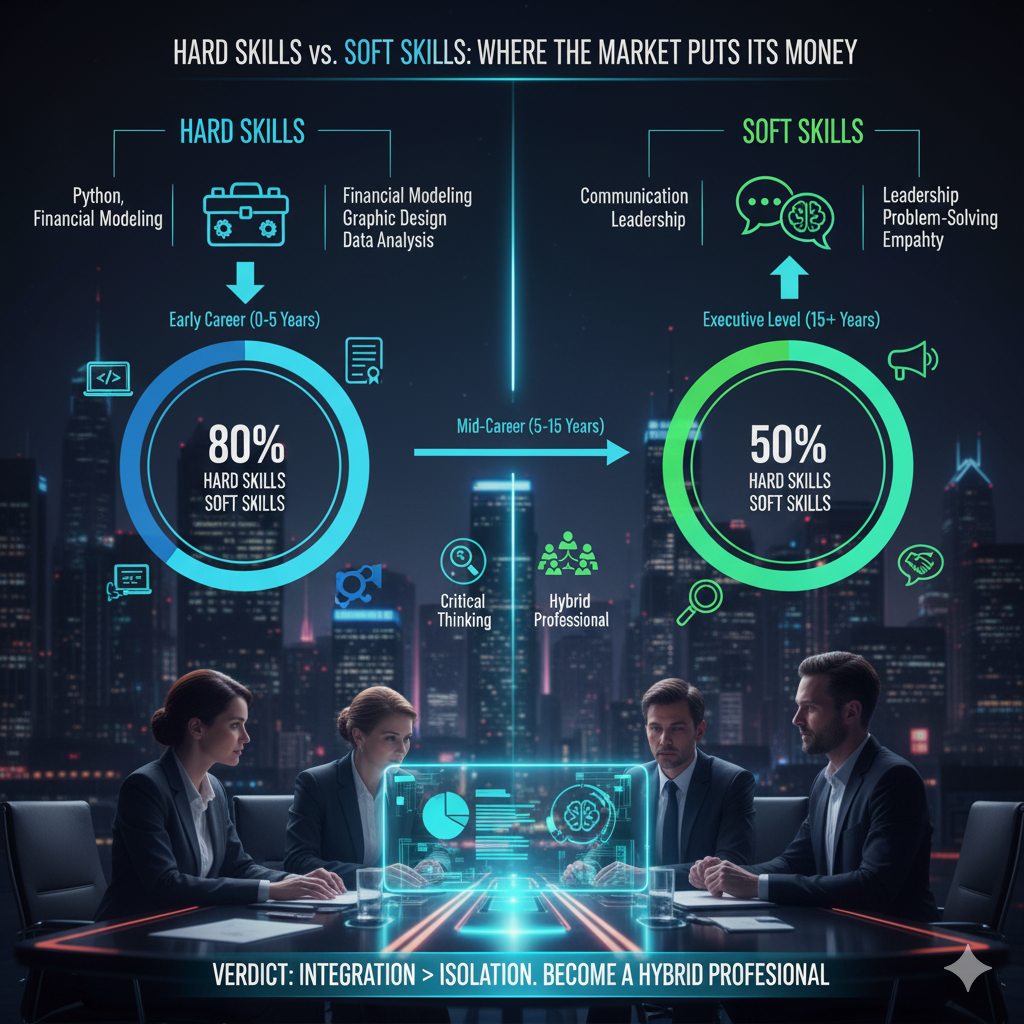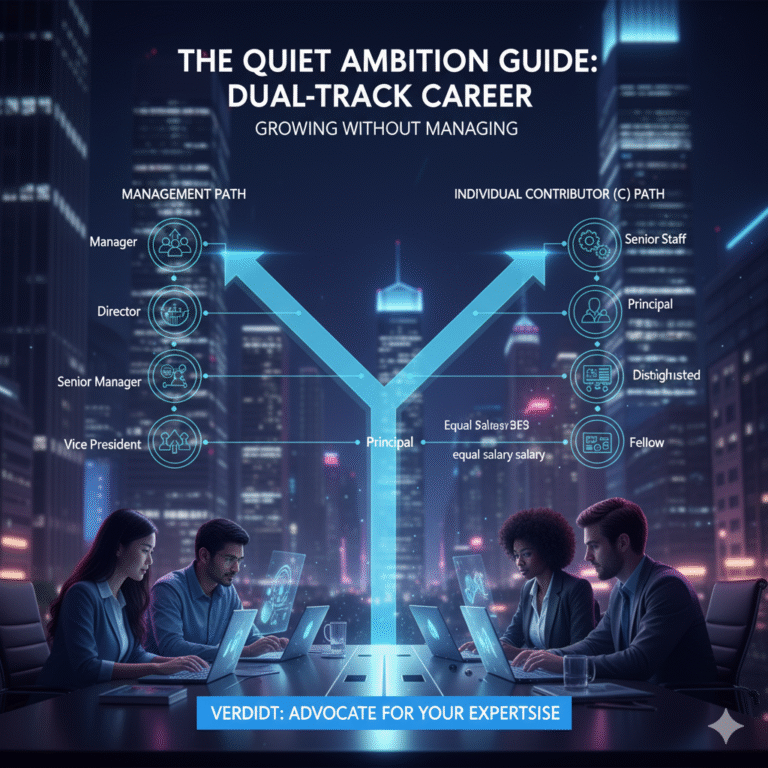Hard Skills vs. Soft Skills: Where the Market Really Puts Its Money (A Job Posting Analysis)
Advertisement
For decades, the career development world has been locked in a cold war: Hard Skills vs. Soft Skills. In one corner, we have the tangible, technical abilities—the “what you can do.” In the other, the interpersonal, behavioral traits—the “how you do it.” Professionals, recruiters, and educators have long debated which set is more critical for success.
The traditional advice has always been a simple platitude: “Hard skills get you the interview, but soft skills get you the job.” While comforting, this advice is dangerously outdated. In an economy being rapidly reshaped by automation, AI, and remote work, the value of these skills is no longer static. The real question isn’t *if* you need both, but *when* and *why* each takes priority.
This article moves beyond opinion and dives into what the market data—gleaned from millions of job postings—actually reveals. The answer isn’t a simple “both,” but a strategic analysis of how the value of hard skills vs. soft skills shifts dramatically throughout your career trajectory.
Defining the Battlefield: What Exactly Are We Comparing?
Before analyzing the market, we must establish clear definitions. This distinction is the root of most of the confusion in the Hard Skills vs. Soft Skills debate.
Hard Skills: The “What” (Your Technical Toolbox)
Hard skills are tangible, teachable, and measurable. They are the specific knowledge and abilities required to perform a task. They are often job-specific and can be proven with a certificate, a degree, or a portfolio.
- Examples: Python programming, SEO optimization, financial modeling, graphic design, fluency in a foreign language, data analysis, carpentry.
- How they are acquired: University, certification courses, bootcamps, textbooks, on-the-job training.
- Why they matter: They are your “ticket to entry.” They prove you are qualified to do the specific job advertised.
Soft Skills: The “How” (Your Operational OS)
Soft skills are intangible, interpersonal, and harder to quantify. They are behavioral traits that dictate how you work, how you interact with others, and how you navigate complex environments. They are often transferable across all jobs and industries.
- Examples: Communication, leadership, problem-solving, emotional intelligence, adaptability, critical thinking, teamwork, time management.
- How they are acquired: Experience, mentorship, self-reflection, high-stakes practice (e.g., leading a project).
- Why they matter: They are your “accelerator.” They determine your effectiveness, your influence, and your ability to scale your impact.
The Market Analysis: What Job Postings Actually Demand
When we analyze job postings in bulk (drawing from research by platforms like LinkedIn and labor market analytics firms), a clear pattern emerges. The demand isn’t just for one or the other; it’s for specific combinations that reflect the true nature of modern work.
The Rise of the “Hybrid Professional”
The highest-paying, most in-demand roles no longer separate hard and soft skills. They demand “hybrid skills.” A company doesn’t just want a “Data Scientist” (hard skill). They want a “Data Scientist who can communicate findings to a non-technical executive team” (hard + soft). They don’t just want a “Sales Manager” (soft skill). They want a “Sales Manager who can analyze CRM data to forecast revenue” (soft + hard).
The Hard Skills vs. Soft Skills debate is dissolving because in practice, they are two sides of the same coin. A hard skill without the soft skill to apply it is useless. A soft skill without any hard skill to back it up is just talk. The market puts its money on professionals who can *integrate* both.
The “Automation-Proof” Premium
The other major trend revealed by market data is the impact of automation. Many routine hard skills are being automated. AI can now write code, design logos, and draft legal documents. This means that possessing *only* the hard skill is becoming a commodity.
What isn’t being automated? The soft skills that *manage* the automation. Critical thinking is needed to set the strategy for the AI. Emotional intelligence is needed to lead the team using the new tools. Problem-solving is needed when the automated system breaks. Soft skills have become the primary defense against professional obsolescence, and companies are paying a premium for them.
The Career Value Shift: How Importance Changes Over Time
The most critical finding from this analysis is that the value of hard skills vs. soft skills is not static. It changes dramatically depending on where you are in your career.
Stage 1: Early Career (0-5 Years) – The Hard Skill Foundation
In the beginning of your career, hard skills are your primary currency. When hiring for an entry-level role, a company is taking a risk. They have no long-term track record to judge you on. Your degree, your portfolio, and your technical interview answers are their only proof that you can actually *do the work*.
At this stage, hard skills are your foundation. You must be technically competent. Your goal is to prove your reliability and execute tasks flawlessly. Your soft skills (like time management and teamwork) are important, but they are secondary to your ability to deliver the core technical requirements of the job.
Stage 2: Mid-Career (5-15 Years) – The Soft Skill Accelerator
This is where the shift happens, and where most professionals get stuck. To move from a “Senior” role to a “Lead,” “Manager,” or “Principal” role, your hard skills become a prerequisite, not a differentiator. Everyone at the senior level is assumed to be technically proficient.
The differentiator—and the skill that justifies a major pay increase—becomes your soft skills. Can you lead a project? Can you mentor junior employees? Can you negotiate a deadline with a difficult stakeholder? Can you present a complex idea to leadership? Your career accelerates not by becoming 10% better at your hard skill, but by becoming 100% better at leveraging your hard skill through communication and leadership.
Stage 3: Executive Level (15+ Years) – The Judgment Economy
At the executive level (Director, VP, C-Suite), the Hard Skills vs. Soft Skills debate is over. You are almost never paid for your hard skills. You are paid for your *judgment*. Your entire job is a collection of high-level soft skills: setting a vision, inspiring a department, making high-stakes decisions with incomplete data, negotiating multi-million dollar deals, and managing complex human dynamics.
An executive’s hard skills (like coding or design) are completely irrelevant. Their value is 100% in their strategic thinking, emotional intelligence, and communication. This is the pinnacle of soft skill valuation.
The Verdict: Stop the Debate, Start the Integration
The market has already made its decision. The debate of Hard Skills vs. Soft Skills is a false dichotomy. The real money and long-term security are in integration.
The market does not pay for a “skill.” It pays for a “solution.” And valuable solutions are always a hybrid of technical execution and human ingenuity. A technically brilliant product (hard skill) that no one understands how to use (failed communication) will fail. A charismatic team (soft skill) that cannot produce a functional product (failed hard skill) will also fail.
Stop thinking about your development as a choice between a technical certification and a leadership course. Start thinking about how to connect them. Ask yourself: “Which soft skill will most amplify the hard skills I already have?” and “Which hard skill will give my soft skills the credibility they need?”
The professionals who can build this bridge—the hybrid professionals—are the ones who are not just surviving, but thriving. They are the ones the market is, and will continue to be, putting its money on.







